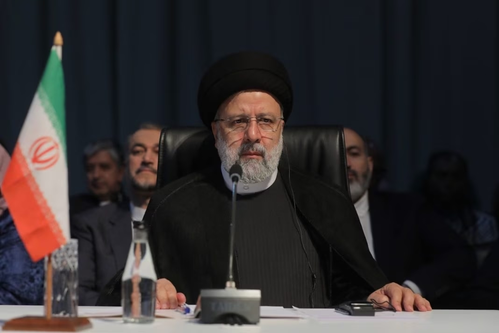The cruel irony of the sad demise of Iranian President Ebrahim Raisi along with the country’s foreign minister and several other officials 20 May after their helicopter crashed in a foggy, mountainous region in the country’s northwest is that the chopper was manufactured in the US, the regime’s sworn enemy. The maintenance of the helicopter had suffered due to non-availability of spare parts, the supply of which was stopped as part of the sanctions against Iran by the US and its Western allies. Iran had purchased the Bell helicopter in the early 2000s. Aircraft in Iran face a shortage of parts. For this proper safety checks are often not carried out. Former Iranian Foreign Minister Mohammad Javad Zarif sought to blame the US for the crash in an interview soon after the tragic news was made public. In strong words of condemnation, he said “one of the main culprits of the tragedy is the US, which embargoed the sale of aircraft and aviation parts to Iran and does not allow the people of Iran to enjoy good aviation facilities.” This, according to him, will be recorded “in the list of US crimes against the Iranian people.” The accusation would sound far-fetched if one considers the fact that it is unbelievable that the helicopter of the country’s all-powerful President had not gone through the motions of rigorous checks before he boarded it.
The outpourings of anger all the same bring out the truth about the regime run by the 63-year-old Raisi now in the grip of its worst crisis as the Middle East is going through a turbulent phase in the wake of the Israel-Hamas war and its spillover affecting neighbouring countries, including Iran. Raisi under Supreme Leader Ayatollah Ali Khamenei launched an unprecedented drone-and-missile attack on Israel just last month. A conservative cleric and former judiciary chief, Raisi was the focus of international attention for his decades of vicious crackdowns against his own people’s aspirations for greater personal freedom and democracy. He was instrumental in the arrest, torture and execution of tens of thousands of the Islamist regime’s opponents.
Educated in the seminary city of Qom since he was 18, he came to be known as “the butcher” for his alleged involvement in the execution of thousands of political prisoners in the late 1980s, according to Iran’s Opposition. As judiciary chief, he ordered the arrests and executions of dozens of protesters against the regime in 2019-2020. His role came in for sharpest criticism in recent times when he crushed the “Women, Life, Freedom” movement that followed the death of 22-year-old Mahsa Amini with iron-fisted repression. Tens of thousands were arrested, and the death toll is estimated to be over 500.
Raisi was believed to be the fittest candidate to replace the 85-year-old, ailing Khamenei as supreme leader for his loyalty to the regime and its brutal methods. However, his lack of competence in managing the country’s economy, which is in trouble, cast doubts about his final elevation. On top of it, the circumstances around his presidential win in 2021 undermined his credibility as a potential leader. He had managed to secure victory through massive disqualification of opponents and on the back of record-low turnout. Most people opted not to vote, while a large number of voters who turned up deliberately spoiled their ballots as a mark of their disapproval of the candidate. His death triggers speculation that Khamenei’s own son, Mojtaba, could be the frontrunner in the race to succeed his father.
Iran’s foreign policy under Raisi was marked by a direct confrontation with the West, with its leaders repeatedly threatening an all-out war against Israel since the start of the Israel-Hamas conflict in Gaza. He also provided military-purpose drones and other weapons and political support to Vladimir Putin’s Russia in the ongoing Ukraine-Russia war. Iran’s ties with China under Xi Jinping were cemented through collaborations, sale of Iran’s oil to China and operation of a large number of Chinese companies in Iran. It is unlikely that Iran’s stand on the raging Hamas-Israel war and attacks on Israel by Iran-backed Houthis and Hezbollah would change after Raisi’s demise. The situation may become even more complicated before a proper replacement of Raisi is found.
In short, the geopolitical situation in and around the Middle East is poised for an even murkier and uncertain phase. This is not good for the world’s economy and peace.
